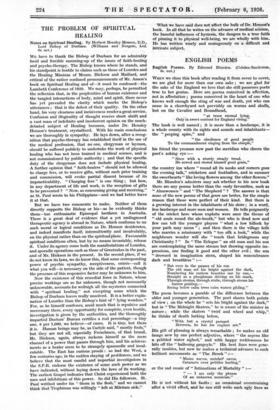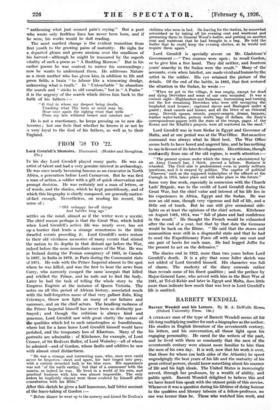ENGLISH POEMS
English Poems. By Edmund Blunden. (Cobden-Sanderson.. 6s. net.)
WHEN we close this book after reading it from cover to cover, we are glad for more than our own sake ; we are glad for the sake of the England we love that she still possesses poets' true to her genius. Here are, poems conceived in affection, not in affectation ; poems conceived in the heart of one who knows well enough the sting of war and death, yet who can muse in a churchyard not peevishly on worms and skulls, but on the Cavalier and Roundhead,
" at truce eternal lying, , Only in sweet content for England viemg."
The book is well named ; it is more than a landscape, it is a whole county with its sights and sounds and inhabitants— the " peeping spire," and " the obedience of good people
To the commandment singing from the steeple," his friend the yeoman now past the meridian who cheers the poet's asking eye :—
" Since with a sturdy steady tread, He sowed and stored himself good grain,"
the country inn where " round all its nooks and corners goes the evening talk," cricketers and footballers, and in summer the sweethearts " like loving flowers among the other flowers."
Mr. Blunden's admirers may ask whether in his new book there are any poems better than the early favourites, such as " Almswomen " and " The Shepherd " ? The answer is that none of the new poems of that genre are better, for the simple reason that those were perfect of their kind. But there is a growing interest in the inhabitants of his shire ; in a word, less landscape and more men and women. He tells poignantly of the cricket hero whose exploits were once the theme of " old souls round the ale-booth," but who is dead now and few can tell the younger players " what a low hillock by your path may mean " ; and then there is the village belle who marries a missionary with " too silk a look," while the neighbours wonder will she " teach that bridegroom any Christianity " In " The Eclogue " an old man and his son are contemplating the same stream but drawing opposite im- pressions, one finding it good and the other evil ; the son " drowsed in imagination stern, shaped his remembrance dark and breathless " :—
" But ever in the pauses of his son
The old man set his bright against the dark, Numbering his curious beauties one by one, — Straight as a ploughman driving on his mark, Through storms, through stubs, through stones his
furrow guiding,—
Seeing below calm trees calm waters gliding."
The poem becomes a parable of the difference between the older and younger generation. The poet shares both points of view ; on the whole he " sets his bright against the dark," but in " The Midnight Skaters," he is aware of the sinister in nature ; while the skaters " twirl and wheel and whip,", he thinks of death lurking below,
" With but a crystal parapet Between, he has _ his engines set." •
• His gift of phrasing is always remarkable ; he makes an old image new by one perfect adjective, where " the aspens like a pebbled water sighed," and with happy recklessness he hits off the " hallooing gargoyle." His best lines were gene- rally iambics, but now he makes a technical advance to such brilliant movements as " The Brook " Minim waves, nutshell caves,
Cataracts over pebbles hurling,"
or the sad music of " Intimations of Mortality "
" — I am only the phrase Of an unknown musician."
He is not without his faults ; an occasional overstraining after a vivid effect, and he can still write such ugly lines as
?-" antheming what just seemed pain's crying." But a poet ?-who wrote only faultless lines has never been born, and if he were, his works would be dull reading.
The most marked change is the evident transition from first youth to the growing pains of maturity. He sighs for a departed gleam and grows anxious over the smallness of his harvest—although he might be reassured by the superb vitality of such a poem as " A Budding Morrow." But in his earlier poems he was content to mirror his surroundings ; now he wants to understand them. He addresses Nature as a stern mother who has given him, in addition to life and green fields, a brain " to labour like a winnowing drudge, unknowing what is truth." In " Unteachable " he abandons the search and " sticks to old vocations," but in " A Psalm" it is the urgency of the search which drives him back to the faith of his fathers :—
" 0 God in whom my deepest being dwells, Unasking what Thy form or mind may be, Hear once again the sighing trust that wells From my late wildered breast and comfort me."
He is not a reactionary, he keeps pressing on to new dis- coveries ; but one feels that whether he knows it or not he is very loyal to the God of his fathers, as well as to their England.



























































 Previous page
Previous page